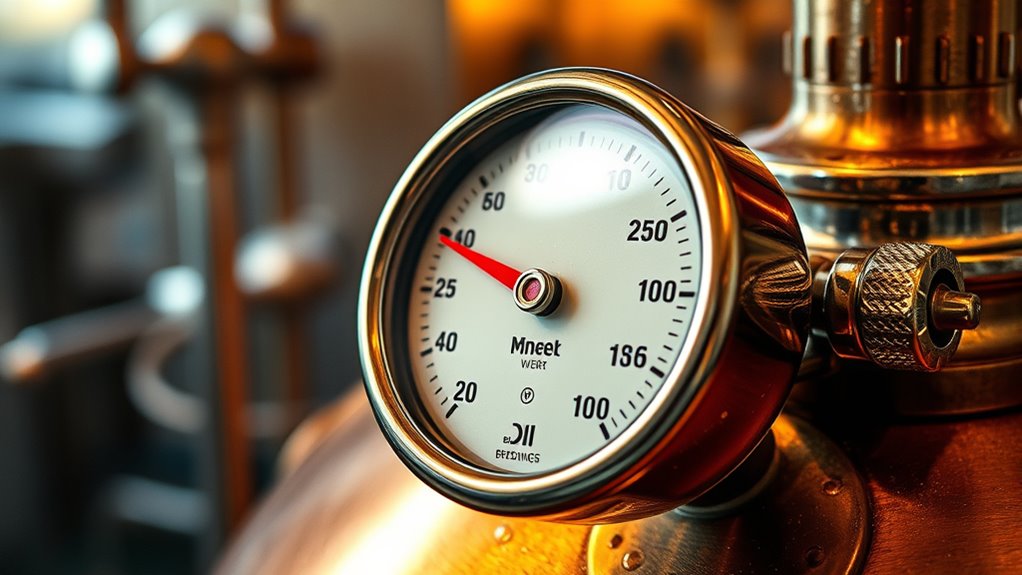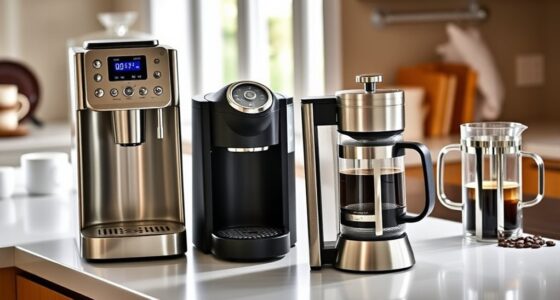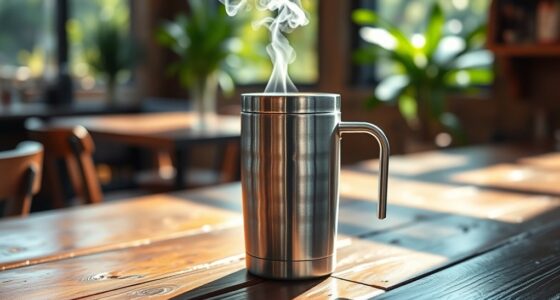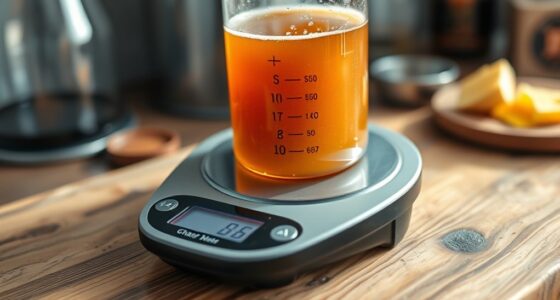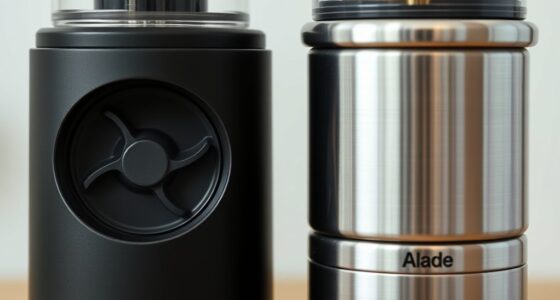Thermometers play a vital role in brewing by helping you monitor and control temperatures during each stage. Digital or dial thermometers guarantee precise readings during mash, boil, and fermentation, guiding you to achieve the desired flavors and consistency. Infrared options allow quick surface checks, while Bluetooth-enabled devices offer real-time data tracking for better control. Mastering proper thermometry keeps your beer consistent and high quality—discover more about choosing the right tools and techniques to optimize your brewing process.
Key Takeaways
- Thermometers ensure precise temperature control during brewing stages like mashing, boiling, and fermentation.
- Different types (digital, dial, infrared) offer specific advantages for accuracy, speed, and surface measurement.
- Regular calibration maintains thermometer accuracy, preventing flavor issues and ensuring consistent brewing results.
- Monitoring temperatures with thermometers helps optimize enzyme activity, sugar extraction, and yeast fermentation.
- Bluetooth-enabled thermometers enable real-time data tracking and enhanced control over brewing conditions.
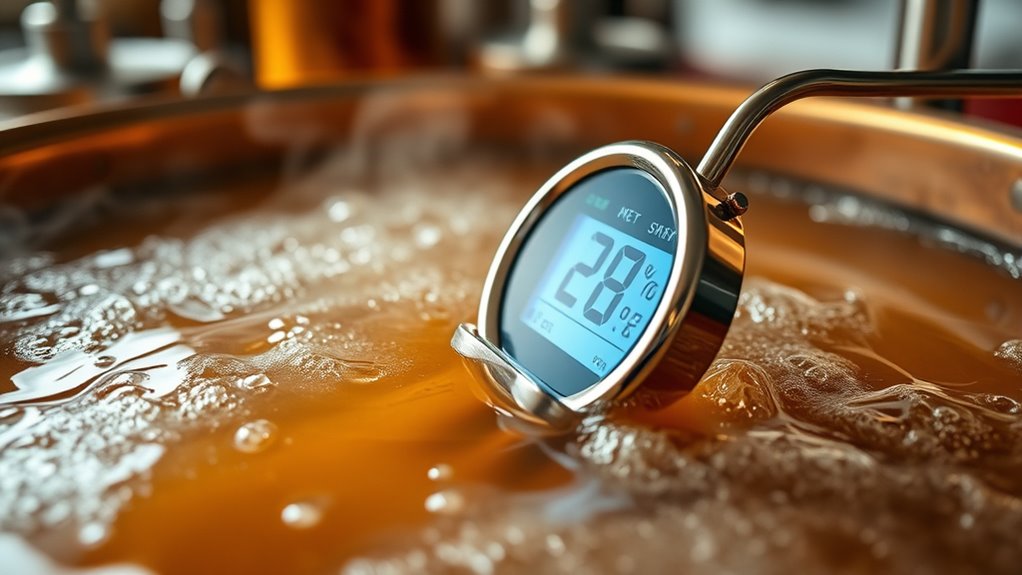
Thermometers play a crucial role in brewing, guaranteeing you achieve the perfect temperature at each stage of the process. Whether you’re using digital thermometers, dial thermometers, or infrared devices, precise temperature measurement is key to brewing success. During home brewing, maintaining exact mash temperature is critical because it affects enzyme activity and sugar extraction. A digital thermometer allows you to quickly monitor and adjust the temperature, helping you stay within the ideal range for converting starches into fermentable sugars. Proper temperature control during mash ensures consistent results, leading to better beer quality. As you move through the brewing process, thermometers help you monitor wort boiling temperatures and fermentation conditions. For fermentation temperature, maintaining the right environment prevents off-flavors and ensures yeast performs effectively. Some brewing thermometers come with calibration features, which you should use regularly—calibrating against standard points like boiling water or ice water guarantees reliable readings. Without calibration, you risk inaccuracies that could compromise your beer’s flavor, consistency, and overall quality. Different thermometer types serve specific purposes. Dial thermometers are simple and durable, often used in kettles or fermenters, while digital probes provide quick, precise readings and can be easily inserted into hot or cold liquids. Infrared thermometers are especially useful for quick surface temperature checks without contact, which is handy for monitoring fermentation vessels or hot surfaces during brewing. Bluetooth-enabled thermometers allow for real-time data tracking via smartphone apps, giving you greater control and insight throughout the brewing process. In recent years, brewing thermometers have become more sophisticated, integrating seamlessly into brewing equipment for real-time monitoring. This integration is especially beneficial for home brewing, where small improvements in temperature control can greatly impact your final product. Accurate thermometry helps in maintaining consistent fermentation temperatures and improves overall brewing outcomes. Proper thermometer calibration is essential here, as even slight deviations can lead to inconsistent results. Choosing the right brewing thermometer depends on your setup and needs. Digital thermometers and infrared devices offer speed and precision, while dial thermometers provide reliability and simplicity. Regardless of the type, consistent temperature control through precise measurement is fundamental to producing high-quality beer.
Frequently Asked Questions
What Is the Function and Purpose of a Thermometer?
You use a thermometer to measure temperature accurately, which helps you monitor and control various processes. Its purpose is to give you real-time, reliable data so you can make adjustments as needed.
How Does Temperature Affect Beer Brewing?
Temperature plays a vital role in beer brewing because it directly impacts enzyme activity during mashing and yeast performance during fermentation.
When you control the temperature precisely, you guarantee efficient starch conversion and proper yeast metabolism.
If the temperature’s too high or low, you risk off-flavors, stalled fermentation, or undesirable beer characteristics.
How Do You Use a Brewing Thermometer?
To use a brewing thermometer, you insert it into your liquid at the correct spot, making sure it’s fully submerged but not touching the vessel’s bottom or sides.
Wait about 30 seconds to a minute for digital probes or until the reading stabilizes for analog ones.
Check the display at eye level for accuracy, record the temperature, and adjust your process to keep conditions just right for each stage.
Why Do Brewers Often Carry a Ph Probe and Thermometer While Brewing Beer?
You carry a pH probe and thermometer while brewing because they help you control critical process parameters. The pH probe monitors acidity levels, ensuring proper enzyme activity and yeast health.
The thermometer keeps track of temperature, which influences mash, boil, and fermentation quality.
Together, they let you fine-tune your process, prevent off-flavors, and produce consistent, high-quality beer.
Having both tools on hand makes your brewing more precise and reliable.
Conclusion
Using a thermometer is essential for brewing success. It helps you monitor temperatures precisely, ensuring your beer ferments perfectly and flavors develop as intended. With accurate readings, you can prevent off-flavors and achieve consistent results every time. Don’t underestimate the power of a good thermometer—it’s your key to brewing great beer. Keep a reliable one handy, and you’ll enjoy better control and tastier brews with each batch. Cheers to precise brewing!
